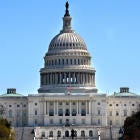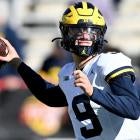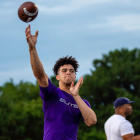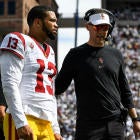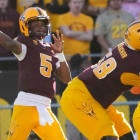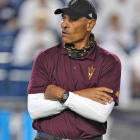A proposed federal law is the latest -- and perhaps most powerful -- attempt seeking to limit spiraling salaries among college coaches. The possibility of an anti-trust exemption emerging from that law would allow schools to limit or cap those salaries with the creation of a national commission that would aim to reform college athletics.
"I'm mortified at these salaries," said House Rep. Donna Shalala (D-FL), sponsor of the CACIA Act of 2019. "We have not been able to slow spending or expenditures."
The bill introduced last month would establish the Congressional Advisory Commission on Intercollegiate Athletics (CACIA) "to investigate the relationship between institutions of higher education and intercollegiate athletic programs."
Most of the national attention for the proposed bill has centered around increased oversight of sexual assault by the NCAA regarding athletes. However, the bill contains a provision that would examine "the amount of funds expended on coaching salaries …"
"I would say this would be discussed. That's really the only way we can stop [spiraling salaries]," Ohio University professor David Ridpath told CBS Sports. "As a public institution, you shouldn't be building a lazy river or paying a strength coach a million dollars."
Ridpath is president of The Drake Group, whose stated mission is to increase academic integrity in college sports. The Drake Group consulted on Shalala's bill.
The bill's formation follows recent outcries for college athletics reform. Shalala is the former university president at Wisconsin and Miami who won Florida's 27th Congressional district House seat in 2018.
Shalala told CBS Sports some of the bill's as-yet unrevealed sponsors include a "consortium" of Republican senators from Southern states that include SEC schools. The currently listed co-sponsors include six legislators from both sides of the aisle.
An ant-trust exemption granted by the federal government would create some sort of restraint on college salaries that have reached record levels. It's an exemption that was granted to Major League Baseball in 1922 that states the sport is not subject to federal commerce laws.
College sports business remains subject to market forces. That extends the eternal conflict between a for-profit business model in athletic departments that bumps up against the nonprofit educational mission of public universities and the NCAA.
Congressional intervention in college sports seems inevitable, at least in some form. The NCAA may need the federal government's help as it transitions to allowing athletes to be paid for their names, images and likenesses.
The association is racing to adopt legislation that would give athletes leeway to commercially market themselves. Meanwhile, several states are adopting name, image and likeness laws that could complicate the NCAA's ability to enforce its bylaws.
The solution may be federal law governing name, image and likeness. NCAA president Mark Emmert recently met with two senators in Washington, D.C. on the subject.
"It's certainly going to take the White House to get involved," former Maryland Sen. Tom McMillen said. "Then you've got impeachment and an election year,. It's a high hurdle, no doubt about it. But they've got to come out with something."
McMillen is a former All-American basketball player at Maryland who is currently head of the Lead1 Association, which represents FBS athletic directors.
"I am sure that with the discussions around NIL, this topic would emerge as one of the tenants that the discussion is based on," said executive director Todd Berry, whose American Football Coaches Association represents college coaches. "Congressional oversight was likely to be a part to a solution if one is needed. The market has driven the salary increases both in the lack of stability of the job along with the funding value of success."
Scrutiny regarding college athletics spending began after NCAA college football television telecasts were deregulated by the U.S. Supreme Court in 1984. With the NCAA out of the way, media rights for conferences and individual schools skyrocketed. Coaching salaries followed suit.
"College sports has never been more popular," said North Carolina athletic director Bubba Cunningham. "There has never been more money associated with college sports. It's not the creation of revenue that's necessarily bad. It's the use. We have strayed from what is most important."
Since December 2017, Clemson's Dabo Swinney and Texas A&M's Jimbo Fisher have become the two highest-paid college football coaches in the history of the game. Fisher is beginning the third year of a 10-year guaranteed deal worth $75 million. Last spring, Swinney signed a new 10-year contract worth $93 million.
"Everybody talks about an antitrust exemption," Clemson AD Dan Radakovich told CBS Sports. "Like everything in life, there's a good antitrust exemption and one that becomes overly regulated. … The physics lab ain't getting $93 million because [football income is] all self-generated."
Shalala said that the SEC pursued Miami in expansion talks in the early 2000s while she was president of the university.
"We just could not compete with their [coaching] salaries," Shalala said.
Miami eventually left the Big East for the ACC.
Over 50 college football and basketball coaches make more than $3 million per year. Critics point to the fact the highest-paid state employees in 40 of 50 states are college coaches.
Florida's Steve Spurrier became the first million-dollar college coach in 1996. Jim Harbaugh's deal was reworked after his first season at Michigan (2015), bumping it to $9 million per year. Including one-time bonuses, Nick Saban made $11 million at Alabama in 2017.
The two coaching staffs (LSU, Clemson) that competed in the 2020 College Football Playoff National Championship made a combined $27 million, according to the Washington Post.
In recent years, contract buyouts have come under increased scrutiny. Buyouts protect both the coach from being fired without cause and also schools if a coach leaves prior to the expiration of his contract.
The average buyout for the top five highest-paid coaches was $30 million, as of Dec. 1, 2019, according to USA Today's coaching salary database.
Coaches argue about the tenuous nature of their profession. In the last three seasons, 68 schools have changed football coaches. That's more than half of the FBS. Florida State, Arkansas and Mississippi State have changed coaches twice in that span.
"Intercollegiate athletics does a very poor job with coaches contracts in general," Cunningham said. "The pro leagues don't have those issues. We have the issues other people don't. Our buyouts are significant. … We need to be better in constructing our contracts. When we commit to a coach, a coach commits to an institution. And you can't go other places."
The current bill may carry more weight because of Shalala's well-known dogged determination for reform and knowledge of college athletics. Her disdain for NCAA hierarchy is no secret. She was Miami's president during the infamous Nevin Shapiro scandal. Hurricanes football ultimately suffered minimal penalties after the NCAA was forced drop some evidence due to improper investigative practices by a former enforcement chief Julie Roe Lach.
"The NCAA, in my opinion, is running scared," Shalala said.
Ridpath added: "Donna has really changed. She was always a reformer. She has definitely become more progressive and certainly sees the NCAA model right now, as it is, unworkable."
The salary discussion is a big reason why there is a name, image and likeness debate. With athletes spending -- by one estimate -- 50 hours a week on what amounts to a job, their main benefit in recent years is better working conditions.
Those conditions improved considerably in the last five years. Cost of attendance, better and more meal choices and team nutritionists are now the norm in most football programs. For those not headed to the NFL or NBA, there is still that free education without student-loan debt.
But the increasing salaries continue to fuel the dichotomy between millionaire coaches and athletes whose earning ability is limited by NCAA rules.
UC Davis athletic director Kevin Blue wrote a notable 2019 opinion piece titled, "Why Congress Should Regulate Salaries and Spending in College Athletics."
"There's going to have to be some sort of systemic intervention because there is no natural way for [the schools] to control themselves [the way college sports is currently structured]," Blue wrote.
He makes three main points on the subject.
- The existing salary market is inefficient because it is inflated.
- Limits on spending would generally benefit athletes.
- Limits on salaries would increase competitive balance.
"There has to be some constraints because it's just gotten out of control or, legally, we're going to have to start paying players," Ridpath said. "That doesn't mean [Duke basketball coach] Mike Krzyzewski might have to get by on $2 million rather than $9 million. You could actually put in a rule that a president should at least get paid $1 more [than a coach]."
There have been at least four comprehensive bills intending to reform amateur athletics in the last 40 years. The Amateur Sports Act of 1978 established the United States Olympic Committee. It asserted that amateurism is no longer a requirement for international competition. McMillen sponsored the Collegiate Athletic Reform Act in 1991 that sought a limited antitrust exemption for football and basketball. The Student Right-To-Know Act from 30 years ago dealt with campus security and athlete participation rates. Legislators sought to establish a presidential commission to investigate college sports in 2014.
At the time, Illinois Rep. Bobby Rush (D) called the NCAA "the last plantation in America."
Like any bill, Shalala's effort faces what looks like a drawn-out process before it becomes law. It must get past the House and Senate before getting in front of the president to be signed.
"It's very difficult to get a complicated bill through," McMillen said. "… Congress is a difficult place."












